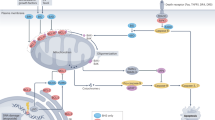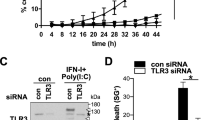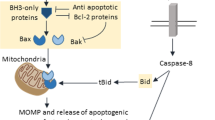Abstract
The activation of caspases is a final commitment step for apoptosis. It is now evident that signal transduction pathways involving specific protein kinases modulate the apoptotic response. Both pro-apoptotic and anti-apoptotic pathways integrate environmental cues that control the decision to undergo apoptosis. Pro- and anti-apoptotic signal pathways regulate the activation of the caspases. In this review we describe our current understanding of apoptotic signal transduction.
This is a preview of subscription content, access via your institution
Access options
Subscribe to this journal
Receive 50 print issues and online access
$259.00 per year
only $5.18 per issue
Buy this article
- Purchase on Springer Link
- Instant access to full article PDF
Prices may be subject to local taxes which are calculated during checkout
Similar content being viewed by others
Author information
Authors and Affiliations
Rights and permissions
About this article
Cite this article
Jarpe, M., Widmann, C., Knall, C. et al. Anti-apoptotic versus pro-apoptotic signal transduction: Checkpoints and stop signs along the road to death. Oncogene 17, 1475–1482 (1998). https://doi.org/10.1038/sj.onc.1202183
Published:
Issue Date:
DOI: https://doi.org/10.1038/sj.onc.1202183
Keywords
This article is cited by
-
Role of alpha-melanocyte stimulating hormone (α-MSH) in modulating the molecular mechanism adopted by melanocytes of Bos indicus under UVR stress
Molecular and Cellular Biochemistry (2020)
-
Reduced risk of apoptosis: mechanisms of stress responses
Apoptosis (2017)
-
NKT cell depletion in humans during early HIV infection
Immunology & Cell Biology (2014)
-
Caudatin induces cell cycle arrest and caspase-dependent apoptosis in HepG2 cell
Molecular Biology Reports (2012)
-
Roles of Bcl-2 family members, PI3K and NF-κB pathways in Escherichia coli-induced apoptosis in human monocytic U937 cells
World Journal of Microbiology and Biotechnology (2011)



